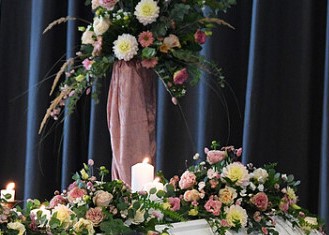My recent research has been about grieving sexuality during a terminal illness and after the death of an intimate partner. There is very little published data about this, and the data that does exist suggests that neither hospice staff nor grief therapists, or even friends, consider this something to be discussed.
The sad part, for me, is that more than 95% of those in the terminal stages of illness want to both discuss this loss and to have help finding a way to manage and mitigate it. 95%. How do we, collectively, miss that group? And their partners? The surviving partners have the same stats, before and after the death. When friends and professionals in the grief and therapeutic communities are polled, the vast majority respond that it does not occur to them, or they wait for the client to bring it up, or, in the vast majority, they never thought to ask.
Further polling comes up with another startling stat: Those who do bring it up stop doing so if the survivor is over the age of… wait for it… 40.
Does sex and intimacy really stop being part of our lives at the age of forty? (I know some of you are younger than that, but trust me, it’s still important). I have clients in their seventies and eighties who have great sex lives, and have enjoyed their relationship more now than they did when raising kids and caring for aged parents.
Why don’t we bring it up? I have some ideas (borne out by my own polling):
- Discomfort, especially with a surviving partner
- Lack of knowledge about how to mitigate the impact of illness on sexuality to allow for a fulfilling experience for a couple about to be separated by death.
- 40- really?
- Waiting for the couple or survivor to bring it up- which means they will not, because they need the professional to give them permission or to show even a modicum of interest.
So how do we do better, as a therapeutic community, for those facing the loss of sexual intimacy before a partner dies, and after their death?
- If there is a hospice involved, get the release signed and contact the hospice social worker or nurse. Have a medical professional prepare to talk about it and give them some tips about how they can enjoy each other still, in the face of medical equipment, the impact of illness, and meds.
- If it is earlier than that, talk with your couple about their intimate life and explore ways they can still find that expressional of sexual intimacy.
- If it is after the death, give permission for your survivor client to talk about that specific loss, and how much they lost at each stage of their late spouse’s illness. I will guarantee it occurred in stages, and they have had losses long before you were aware of it.
- Make sure you are the one to bring it up and give permission to talk about and acknowledge it. Sexuality is normal, part of relationships, and a true loss. And many of those around the survivor will not be supportive of them finding a place to fulfill their needs. It violates the rules for grief written by those who have not lost a spouse. That’s especially true for seniors and their adult children. (Mom wants to date again???)
- Allow our client to develop their own plan to manage their grief process, and to include sexual expression as part of that.
I realize that grief is not something many therapists are not comfortable with, and adding sexuality to it is a lot to ask. I also see the needs expressed in closed social media groups by survivors who are feeling unheard, unsupported, and alone. I read the studies. Let’s be better for them.




